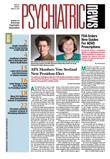A classic Southern novel, The Heart Is a Lonely Hunter, by Carson McCullers, focuses on the theme of loneliness in people's lives and how it can drive them not just to despair, but to suicide.
But loneliness may have another pernicious effect as well—Alzheimer's disease. Chicago researchers have found that it doubles people's chance of developing the illness.
Robert Wilson, Ph.D., a professor of neuropsychology at Rush University Medical Center in Chicago, led the study team, whose results appeared in the February Archives of General Psychiatry.
The study involved more than 800 older people without dementia whom they recruited from senior-citizen facilities in and around Chicago. Wilson and his coworkers assessed these individuals for perceived loneliness at the start of the study and then annually for four years.
“I experience a general sense of emptiness,” “I miss having people around,” “I often feel abandoned,” and“ I miss having a really good friend” were some of the statements that subjects expressed when they were experiencing loneliness.
The brains of subjects who died during this four-year period were examined for Alzheimer's; 76 were found to have had it.
Wilson and his team then looked to see whether loneliness could be linked to acquiring Alzheimer's and found that it could. The risk of Alzheimer's was more than doubled in lonely persons.
Moreover, the investigators had evaluated the subjects for depression, both at the start of the study and annually during the four-year follow-up. They also found a link between depression and the risk of Alzheimer's. But when they scrutinized the relative contributions of loneliness and depression to Alzheimer's risk, the contribution of the former was stronger. In fact, they found that a question on the depression questionnaire that pertained more to loneliness than to depression predicted the occurrence of Alzheimer's more reliably than did the remaining questions that more directly focused on depression per se.
“These data,” Wilson and his group wrote, “suggest that the association of loneliness with dementia is at least partly independent of depressive symptoms... [and that] loneliness may be an important component of the association of depressive symptoms with Alzheimer's.”
And even when some other possibly confounding factors besides depression were taken into consideration, the link between loneliness and Alzheimer's remained potent. (These factors, along with loneliness and depression, were measured in subjects at the start of the study and annually during the four-year follow-up.)
For example, lack of physical and mental activity are known Alzheimer's risk factors. When the former was taken into consideration, the link between loneliness and Alzheimer's remained just as strong as before, and when the latter was taken into account, the link between loneliness and Alzheimer's was weakened, but only a little (about 15 percent).
“The most interesting part of the results to me,” Wilson told Psychiatric News, “was that the subjective feeling of loneliness predicted development of Alzheimer's disease even after we controlled for objective indices of social engagement such as the size of one's social network or frequency of socially interactive activities.”
That loneliness predicts the development of Alzheimer's, of course, does not prove that loneliness is a cause of it, Wilson and his group said in their study report. It could also be that loneliness is a consequence of dementia, perhaps as a behavioral reaction to diminished cognition or as a direct result of the pathology contributing to dementia. However, they do not believe that that is the case for various reasons. For example, although loneliness predicted a decline in cognition, a decline in cognition did not predict an increase in loneliness.
Yet, presuming that loneliness does contribute to Alzheimer's in some manner, how might it do so? Wilson and his colleagues suspect that loneliness might somehow compromise neurons underlying thinking and memory, and if that is the case, then these neurons might be less capable of “pinch hitting” for neurons afflicted with the Alzheimer's disease process.
Indeed, in some preclinical studies, animals subjected to social isolation showed fewer neuronal connections in the prefrontal cortex and hippocampus than did animals that were not isolated.
In any event, “all participants in this study, which is ongoing, have agreed to brain autopsy at death,” said Wilson. He then hopes to use the harvested brain material to hunt for changes that loneliness inflicts—changes that might prep the brain for the Alzheimer's disease process.
The investigation was funded by the National Institute on Aging and the Illinois Department of Public Health.
